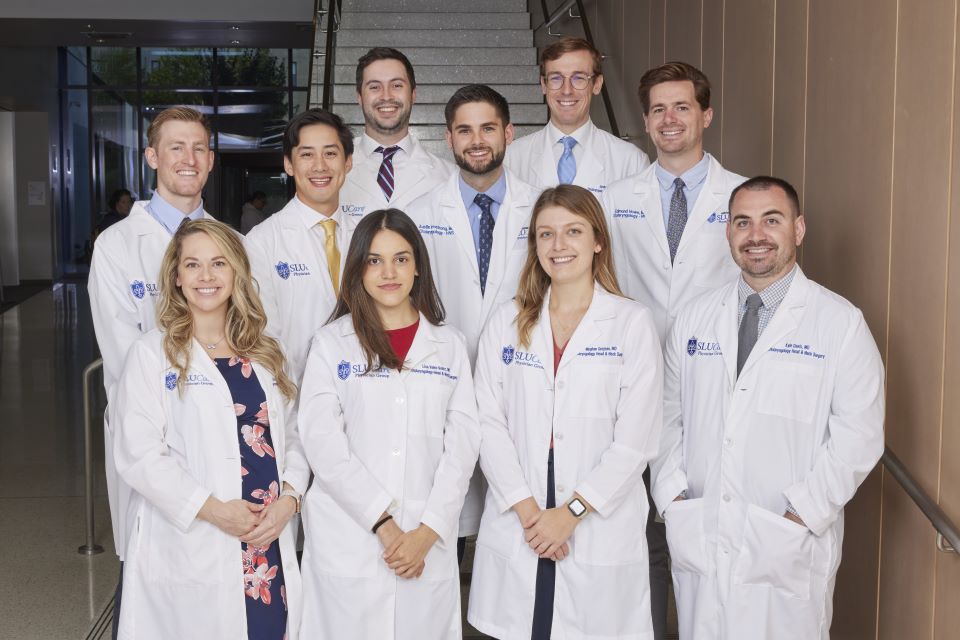Otolaryngology Residency Program
In the Saint Louis University Department of Otolaryngology-Head and Neck Surgery, we firmly believe that resident education improves the quality of care of our patients.
A significant part of our Jesuit mission is educating the next generation of physicians. This commitment infuses every decision and everything we do within the department, resulting in a continued ability to match SLU's residents to fellowships and jobs of their choice.
In the operating room, our otolaryngology residents' case numbers are in the top percentile in the country. Rotation time is reserved for independent research and faculty mentors are readily available. Attendance at local, regional and national meetings is encouraged, and the department subsidizes resident travel.
Message from Residency Program Leadership
At Saint Louis University's Department of Otolaryngology-Head and Neck Surgery, we firmly believe resident education improves the quality of care for our patients. Residents experience hands-on training with our physicians in adult and pediatric clinics. In the operating room, our residents' case numbers are in the top percentile in the country.
We strive to remain agile in resident education with continual tailoring of the didactics. The senior residents lead the choices for book club and teaching conferences and work closely with our attending-led didactic sessions. Residents engage in innovative research projects, presenting their work at national meetings and publishing manuscripts in industry-specific journals.
We support the University's mission to encourage the education of the next generation of physicians. The commitment to resident education infuses every decision, activity, and communication within the department, resulting in our residents matching into fellowships and jobs of their choice.
Saint Louis University School of Medicine
Department of Otolaryngology-Head and Neck Surgery
Residency Program Features

Our five-year residency program provides comprehensive training in otorhinolaryngology-head and neck surgery. Major emphasis is placed on outpatient care, inpatient management and operative technical skills. Senior otolaryngology residents at SLU lead the choices for book club and teaching conferences and work closely with our attending-led didactic sessions.
| Program Questions | Program Answers |
|---|---|
| Residents Per Year | Two |
| Length of Program | Five years |
| Call | Home |
| Research Block | Three months as PGY3 |
| Board Accreditation | Full |
| PGY1 Salary 2021-2022 | $54,361 |
| Chief Salary 2021-2022 | $63,643 |
Program Core
The first year of the residency is spent as a general surgery intern in the Saint Louis University Department of Surgery. All SLU otolaryngology residents are expected to fulfill their general surgery internship requirement at Saint Louis University.
The remaining four years are spent in the otolaryngology department. A three-month research rotation is reserved during the PGY-3 year. The training program provides for graduated responsibility, culminating in the chief residency year. There is full attending supervision in the office and operating rooms in all our affiliated institutions.
SLU serves as the academic base for the otolaryngology residency. The other major affiliations of the otolaryngology training experience include SSM Health Cardinal Glennon Children's Medical Center and Mercy Hospital St. Louis. Residents rotate at each of these facilities during their residency training.
PGY 1 Rotation Schedule
| Department | Time Period |
|---|---|
| Otolaryngology | Five months |
| Pediatric Otolaryngology | One month |
| Neurosurgery | One month |
| Anesthesia | One month |
| Plastic Surgery | One month |
| Surgical Critical Care (ICU) | One month |
| Emergency Medicine | One month |
| General Surgery | One month |
Application Process
Saint Louis University School of Medicine's Department of Otolaryngology Training Program accepts applications through the Association of American Medical Colleges Electronic Residency Application Service (ERAS). Applicants' completed files are forwarded to our program by ERAS and are reviewed by our committee. We conduct two interviewing sessions.
Applicants learn of their application/interview status by November. Our program receives about 200 applications and traditionally interviews 36 applicants for two available first-year otolaryngology resident positions.